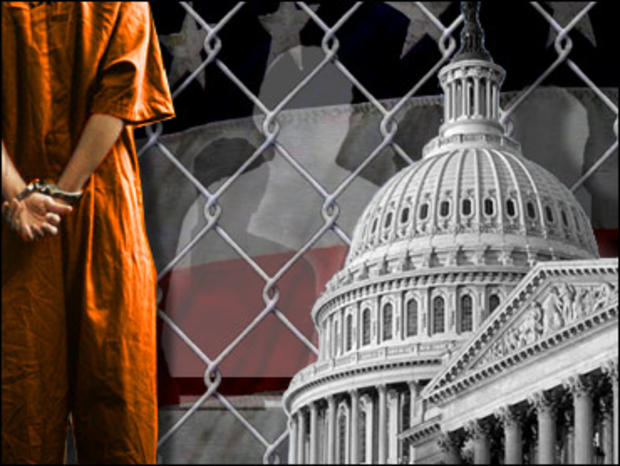Senate keeps controversial detainee policy in defense bill
The Senate on Tuesday voted to keep a controversial provision regarding military detainees in a Defense spending bill, setting up a showdown with President Obama.
The controversial language in question would require the military to detain terrorist suspects, including U.S. citizens, allowing for their indefinite detention. Sen. Mark Udall, D-Colo., led an effort to remove the language and provide more room for study on the issue, but his amendment was rejected by a vote of 37 in favor to 61 against.
President Obama has promised to veto the Defense bill if it includes the controversial provision, with his administration arguing that applying the new rules within the U.S. would challenge the "fundamental American principle that our military does not patrol our streets."
The vote indicates the fight over the provision isn't over -- its supporters did not garner enough votes today to override the president's veto.
In spite of the president's protests, the provision's supporters -- primarily the leaders of the Senate Armed Committee, Sens. John McCain, R-Ariz., and Carl Levin, D-Mich. -- argue the measure would simply put into law a counterterrorism system already in place, codifying rules that are currently based on court decisions and executive orders.
"We're trying to provide tools and clarity that have been missing for 10 years," Sen. Lindsey Graham, R-S.C., said on the Senate floor in defense of the provision. Arguing that suspected al Qaeda allies shouldn't be treated as criminal defendants, he told his Senate colleagues, "This is your chance to speak on the central issue after the attacks 9/11: Are we at war, or are we fighting a crime?"
Udall's amendment would have removed that aspect of the Defense bill, instead requiring various officials to issue a joint report detailing gaps in current detention policy. After the report was released, Congress could once again take up the issue.
"This is a debate we need to have, it's a healthy debate," Udall said today, "but we ought to be armed with all the facts... before we move forward."
Citing the objections to the provision from Defense Secretary Leon Panetta and FBI Director Robert Mueller, Udall continued, "It concerns me we would tell our national security leadership... that Congress knows better than they do... What I am asking is to listen to those who are on the front lines of fighting terrorists."
Specifically, the provision in question would require al Qaeda terrorists to be held in military custody. However, it would allow the administration, through a waiver, to choose to hold a detainee in civilian custody. The administration would also decide who would fall under the new rule.
Udall argued in a Washington Post op-ed today that it would give the military "unprecedented power on U.S. soil" and interfere with the progress the FBI has made working with state and local law enforcement officials to prevent terrorism.
Debate over the provision did not exactly fall down partisan lines. Sixteen Democrats, as well as independent Sen. Joe Lieberman, joined Republicans in voting against Udall's amendment. Two Republicans -- Rand Paul of Kentucky and Mark Kirk of Illinois -- joined the rest of the Democrats in supporting it.
Paul said that "detaining American citizens without a court trial is not American."
Levin, meanwhile, quoted the Supreme Court, which said in 2004, "There is no bar to this nation's holding one of its own citizens as an enemy combatant."
Al Qaeda "brought this war to us, and if it's determined that even an American citizen is a member of al Qaeda, then you can apply the law of war, according to the Supreme Court," he said.
